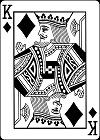 During a period of enforced absence last year, I distracted myself at times by playing virtual poker with people online – not for real money, I hasten to add.
During a period of enforced absence last year, I distracted myself at times by playing virtual poker with people online – not for real money, I hasten to add.
Looking back on that experience a few things struck me. If they appear obvious to you, I apologise in advance.
- We are not best at decision-making when we are emotional. In reaction to certain events in a game I sometimes became reckless, and would bet beyond my self-imposed limits as a result of being annoyed, frustrated or upset. If you’ve just “lost” to someone and they’re taunting you with it, it’s not always easy to remain detached. To look at this in a work context, it is very helpful to identify when you are in an emotionally charged state, and make a particular effort to be deliberate in your responses and decisions as a result. It is also important to identify when someone else may be trying to do their best work when in this kind of state, so we can provide the appropriate support.
- Virtual poker is not the same as real poker – and interacting with colleagues in person is not the same as working with people virtually through webex or phone. The ability to read body language, facial cues and repeated physical behaviours is as important in the work environment as it is in poker. If we miss important “tells”, it can end up costing us and our teams. Where possible, it is very helpful to have regularly scheduled face-to-face meetings (in person or via video/telepresence) with remote colleagues.
- Life and chance can appear capricious. What can seem like a “dead cert” can fall apart for reasons that are not always immediately clear. We need to be resilient and manage our responses when things don’t turn out the way we thought they would. It’s often good to have a plan B to deal with unexpected shocks. To put it another way, be careful when you bet the farm!
- Distraction is a multi-billion dollar industry. Facebook, Twitter, on-line video games, etc. all have one purpose – to get you to commit just one more minute of your time to something which builds revenues for those companies and adds little to no value to our lives. We are an easily distractable species, and billions of dollars goes into pulling our attention away from the present task. In a work context, each small distraction, be it an email notification or a social media notification on our personal or work device breaks our concentration, and it can take 20+ minutes to re-establish focus after each interruption. I was listening to one of Tim Ferriss’ podcasts over the weekend where he indicated that he has his phone in Airplane mode for 80% of the day for precisely this reason.
Lastly, I would probably starve as a professional poker player. I got to a point where I had accumulated over $4m in virtual chips (from a starting point of $10K) and was feeling pretty pleased with myself. Over the course of two weeks of bad hands, poor decision-making (see my first bullet) and unexpected shocks, I lost it all. This completely cured me of any desire to go back and play again. The only lesson I can extract from this is to know what I’m good at and what I’m not, and invest in the former, not the latter!
|
|

